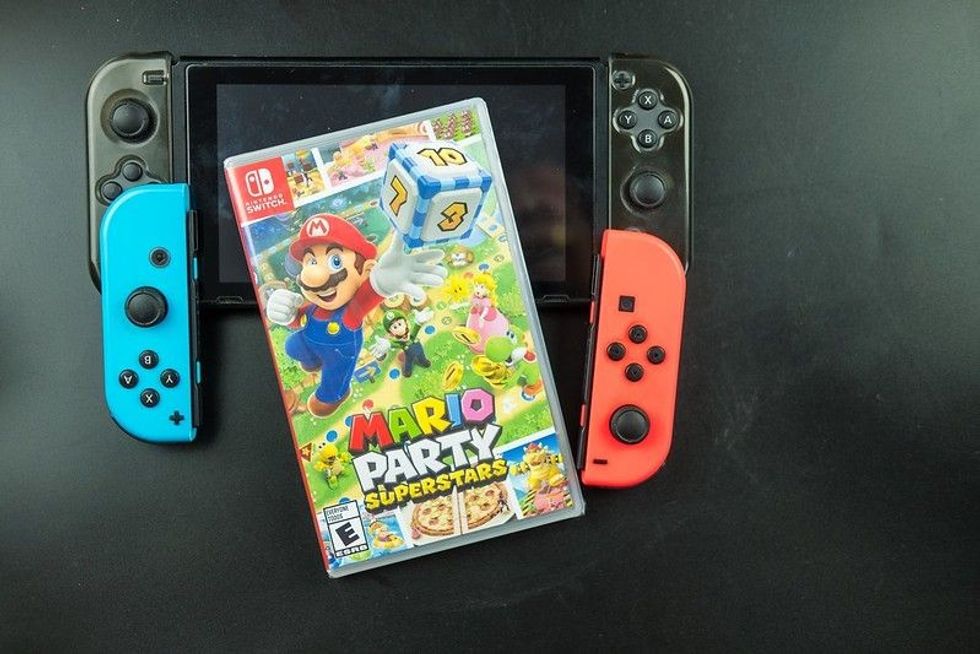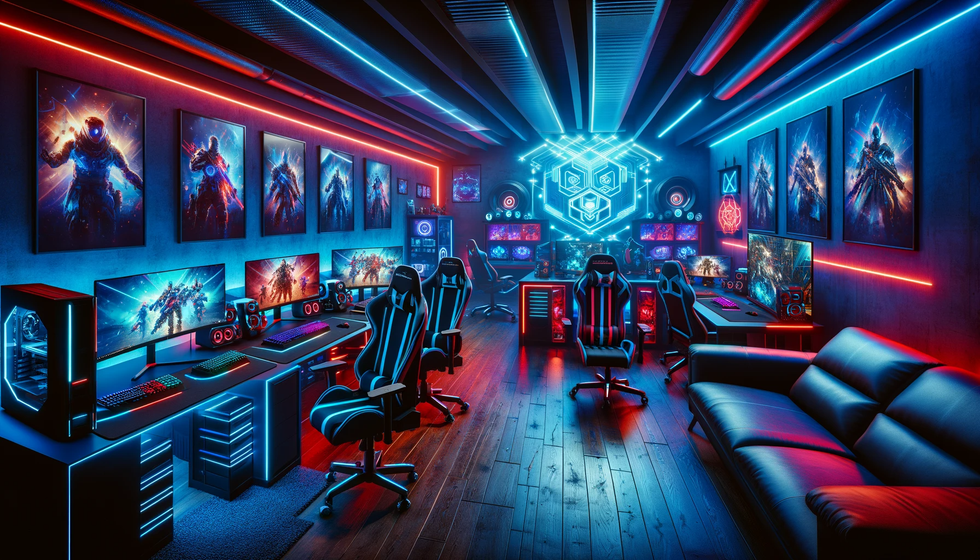Facts About Video Games: Are They Really Good For Kids?

Content
- The Origin Story Of Video Games
- The Benefits Of Video Games For Kids
- The Potential Hazards Of Gaming
- Encouraging Healthy Gaming Habits
- How The Video Game Market Shapes Childhood Experiences
- The Historical Success Of Video Game Consoles
- The Golden Age Of Arcade Video Games
- The Global Impact Of Video Games: Facts And Figures
- The Connective Power Of Multiplayer Games
- What is the best-selling video game of all time?
- How old is the average video game player?
- How can I tell if my child is addicted to video games?
- What role does the video game character play in a child's experience?
- Can video games contribute to a career in technology?
- What is user-generated content in video games?
- How do home consoles ensure kid-friendly content?
- Are there health benefits to playing video games?
Video games are everywhere these days, and kids love them! It's natural for parents to wonder whether all those hours in front of the screen are good or bad for their child. The truth is, video games have their pros and cons – it depends on the type of game, how long your child plays, and whether you're involved as a parent.
In this article, you'll take a trip through the world of video games and how they might affect kids. You'll learn about how video games got started way back when, all the way up to today's fancy consoles and phones. We'll look at both the good and bad sides of gaming, plus give you tips on how to help your child build healthy gaming habits.
The effects of video games on kids are a hot topic. By learning the facts, you can make better choices about your child's screen time and help them get the most out of gaming while avoiding any downsides. Let's discover what video games are all about!
The Origin Story Of Video Games

Explore the journey of video games, from their earliest beginnings to the incredible experiences we enjoy today. Learn about the first consoles and the unforgettable games that made history.
- The video game industry has come a long way since the first video game was created in the '50s.
- It began in the '50s and '60s with simple games and simulations on minicomputers and mainframes.
- The earliest video games were simple, text-based games played on mainframe computers.
- The first notable video game was 'Spacewar', developed by MIT students in 1962.
- The very first arcade video game, 'Computer Space', was released in 1971, setting the stage for a multi-billion dollar industry.
- The '70s marked a pivotal decade for the arcade video game industry, with games like 'Pong' (released by Atari in 1972) and 'Space Invaders' (developed by Tomohiro Nishikado and released by Taito in 1978) leading the charge.
- Home entertainment changed forever with the introduction of the first video game console, the Magnavox Odyssey, in 1972.
- The video game crash of 1983, also known as the Atari shock in Japan, was a major economic downturn in the video game industry that occurred primarily in North America from 1983-1985.
- The crash caused several companies to go out of business and made people question whether the video game industry could survive. This was a major turning point that changed the way video games were made and had a long-lasting impact on the industry.
- The early '90s marked significant technological advancements and the introduction of new gaming consoles that set the stage for modern gaming.
- The Sony PlayStation, released in 1994, and the Nintendo 64, released in 1996, were part of this new wave of consoles that featured 3D graphics and more complex gameplay, which indeed became the norm and greatly expanded the video game market.
- Home gaming consoles, like the Atari 2600 and Nintendo Entertainment System (NES), brought video games into people's living rooms. Popular games included 'Pac-Man', 'Super Mario Bros.', and 'Donkey Kong'.
- 2000s-present: The video game market has continued to grow with the introduction of new gaming consoles like the Microsoft Xbox and the rise of PC gaming and mobile gaming. Online gaming and downloadable content have also become prevalent.
- Gaming consoles have become a staple of home entertainment. Systems like Microsoft's Xbox and Sony's PlayStation remain at the forefront of the industry, constantly improving the gaming experience.
- The PC gaming sector has experienced significant growth. Developments in graphic design and programming languages allow for the creation of more complex and visually engaging games.
The Benefits Of Video Games For Kids

Video games aren't just about having a good time. They can help kids develop important skills too! With some guidance from parents, video games have some surprising benefits.
- Lots of video games make kids use their brains to figure out puzzles and get to the next level. This kind of active thinking can help them become better problem-solvers.
- Video games that require players to explore, such as 'Super Mario Bros.' and 'The Legend Of Zelda', can inspire creativity and imagination.
- Playing video games can improve hand-eye coordination and reaction times in kids.
- Cooperative and competitive formats in games like 'Super Smash Bros.' and 'Minecraft' can enhance social skills and teamwork.
- Some video games, such as adventure games and role-playing games, can teach valuable skills and knowledge.
- Educational games provide a fun, interactive way to learn various subjects, from language arts to mathematics.
The Potential Hazards Of Gaming
While video games can be beneficial, there are also potential drawbacks and concerns to be aware of:
- Kids can sometimes get hooked on video games and start playing them too much. When this happens, they might stop doing other things they usually enjoy, like playing with friends or going outside.
- Many people also worry about how much time kids spend in front of screens and whether it might be bad for their health.
- Some video games contain violence, explicit themes, or other content that may not be suitable for children.
- Playing video games for hours on end can lead to less physical activity and potential health issues.
- Some studies suggest that exposure to violent video games may increase aggressive thoughts and behaviors in children.
- The age ratings of games like 'Grand Theft Auto' and 'Mortal Kombat' are important to consider for parents who monitor their children's gaming habits.
Encouraging Healthy Gaming Habits

As a parent, you can encourage healthy gaming habits by following these tips and strategies:
- Set time limits and boundaries such as allowing gaming only after kids complete their homework.
- Monitor the content of the games your child plays, and ensure that they are age-appropriate.
- Encourage a balance of activities, including outdoor play, socialization, and other hobbies.
- Play video games with your child to bond with them and discuss any concerns.
- Teach online safety and responsible gaming behaviors such as not sharing personal information with strangers.
How The Video Game Market Shapes Childhood Experiences
Explore how the expansive and ever-changing video game market impacts how children play, learn, and grow:
- The video game world offers something for everyone. You'll find everything from high-speed racing games to exciting adventures, and even games where you build whole worlds (simulations) or become your favorite character (role-playing games).
- With game development becoming more accessible, the industry has seen a rise in indie and user-generated content, offering kids a wider variety of experiences.
- To meet the growing demand, there are more ways to play games than ever before, including traditional consoles, PC games, mobile devices, and virtual environments.
- The way users can buy extra items or bonus levels within games has changed how much money game companies make. This also affects how families decide which games to buy.
- More games are being made with strong female characters and stories from different cultures. This shows that game developers are trying to make games that include a wider variety of people.
- Games like 'Tomb Raider' and 'Horizon Zero Dawn' feature strong women in the main roles. This helps break the idea that only men can be heroes in video games.
- Many modern games have rich stories that help players develop empathy and understanding. These games let you experience life from the perspective of characters who are very different from you.
- Developers are working hard to make video games more accessible. This means children with various disabilities can also enjoy playing games and experience the positive things they offer.
The Historical Success Of Video Game Consoles
Gaming consoles began a revolution, bringing the excitement of video games into homes and transforming the way people think about entertainment.
- The first major-selling video game console was the Atari 2600, released in 1977, which popularized the use of cartridges containing game codes.
- When families began to play video games at home, it marked a shift from the traditional arcade gaming scene to personal gaming experiences.
- Today's video game consoles do more than just play games. They let users watch their favorite shows, connect with friends online, and are an all-around entertainment center for the living room.
The Golden Age Of Arcade Video Games

It's time to journey back to the roots of gaming! Explore how arcade culture shaped the video games you love.
- The late '70s and early '80s are often referred to as the 'golden age' of arcade video games, with classics like 'Pac-Man' and 'Donkey Kong' captivating players.
- Arcades provided both entertainment and a social experience, fostering friendly competition and a sense of belonging among players.
- The success of arcade games led to the development of home console versions, allowing players to enjoy their favorite games without the need for quarters.
- Classic arcade games laid the foundation for how people play video games today. Their simple but brilliant ideas continue to inspire game developers.
The Global Impact Of Video Games: Facts And Figures
Learn more about the world of video games through these fun facts. You might be surprised at how far gaming culture has spread.
- Billions of people around the world enjoy playing video games, making them a truly popular form of entertainment.
- The video game industry is booming, with estimations of its worth at almost $200 billion in 2022.
- Popular video game characters and worlds have inspired a whole range of products, including movies, books, and merchandise. This shows just how influential games can be.
- You might be surprised to learn that the average gamer is in their early thirties. Video games aren't just for kids!
The Connective Power Of Multiplayer Games
Discover how multiplayer gaming experiences bring people together, foster community, and develop social skills among young players.
- Multiplayer games allow kids to communicate and collaborate with friends and players from around the world, building a sense of community and shared experiences.
- Titles such as 'Fortnite' and 'Among Us' have become virtual playgrounds where players can practice teamwork, take turns leading, and figure out how to solve problems together.
- Online gaming communities offer a platform for players to share tips, celebrate wins, and make friends that last even when they're not playing.
- Gaming tournaments and esports events have created new social hubs, where kids and teens can connect over shared interests and compete in organized, team-based environments.
FAQs
What is the best-selling video game of all time?
Minecraft, released in 2011, is the best-selling video game of all time, with over 300 million copies sold across various platforms.
How old is the average video game player?
According to the Entertainment Software Association, the average age of a video game player in the United States is 35 years old.
How can I tell if my child is addicted to video games?
Signs that someone might be struggling with video game addiction include spending less time on other things they enjoy, having trouble in school, and seeming upset or restless when they can't play. If you're worried about your child, it's important to seek help from a professional.
What role does the video game character play in a child's experience?
Video game characters often become heroes and role models for children. They provide a connection point to the game and can influence a child's imagination and play outside of the digital world.
Can video games contribute to a career in technology?
Yes, playing video games can spark an interest in technology, leading to careers in game development, graphic design, programming, and other tech-related fields.
What is user-generated content in video games?
This refers to in-game material created by players, offering a personalized touch to the gaming experience.
How do home consoles ensure kid-friendly content?
Home consoles now come with parental controls that help monitor and manage what kids play and for how long.
Are there health benefits to playing video games?
Playing video games in moderation can improve cognitive skills such as reaction time, strategic planning, and memory. Additionally, games that require physical activity can promote exercise and coordination.
Video games can be a great source of entertainment and learning for children. However, parents and caregivers need to be involved in their child's gaming experiences. With guidance, video games can offer valuable lessons, foster friendships, and provide a fun outlet for kids.
Just like adults enjoy play and imagination, video games let kids explore exciting worlds and try new things. The key is to talk to your child about what they're playing, understand the games, and make sure they stay happy and healthy. With a little guidance, video games can be a great addition to your child's life.
We Want Your Photos!
More for You
Sources
Bachelor of Science in Mathematics & Computer Science

Ijeoma AsuohaBachelor of Science in Mathematics & Computer Science
Ijeoma is a passionate mathematics and computer science graduate with a penchant for problem-solving and education. Growing up in a large family, she developed a strong sense of responsibility and a love for nurturing young minds. Driven by her natural inclination, Ijeoma often found herself tutoring and mentoring her little cousins and nephews, and She discovered a deep satisfaction in witnessing their growth. Her interactions with her family members sparked a desire to pursue a career where she could combine her technical expertise with her passion for education. Inspired by Kidadl's mission to empower young learners through engaging content, Ijeoma is eager to contribute her skills and knowledge to the team. With her background in mathematics and computer science, coupled with her nurturing nature and teaching experience, she aspires to create impactful educational resources that spark curiosity and inspire learning in children worldwide.
Bachelor of Science specializing in Human Anatomy

Joan AgieBachelor of Science specializing in Human Anatomy
With 3+ years of research and content writing experience across several niches, especially on education, technology, and business topics. Joan holds a Bachelor’s degree in Human Anatomy from the Federal University of Technology, Akure, Nigeria, and has worked as a researcher and writer for organizations across Nigeria, the US, the UK, and Germany. Joan enjoys meditation, watching movies, and learning new languages in her free time.
Disclaimer
1) Kidadl is independent and to make our service free to you the reader we are supported by advertising. We hope you love our recommendations for products and services! What we suggest is selected independently by the Kidadl team. If you purchase using the Buy Now button we may earn a small commission. This does not influence our choices. Prices are correct and items are available at the time the article was published but we cannot guarantee that on the time of reading. Please note that Kidadl is a participant in the Amazon Services LLC Associates Program, an affiliate advertising program designed to provide a means for sites to earn advertising fees by advertising and linking to Amazon. We also link to other websites, but are not responsible for their content.
2) At Kidadl, we strive to recommend the very best activities and events. We will always aim to give you accurate information at the date of publication - however, information does change, so it’s important you do your own research, double-check and make the decision that is right for your family. We recognise that not all activities and ideas are appropriate for all children and families or in all circumstances. Our recommended activities are based on age but these are a guide. We recommend that these ideas are used as inspiration, that ideas are undertaken with appropriate adult supervision, and that each adult uses their own discretion and knowledge of their children to consider the safety and suitability. Kidadl cannot accept liability for the execution of these ideas, and parental supervision is advised at all times, as safety is paramount. Anyone using the information provided by Kidadl does so at their own risk and we can not accept liability if things go wrong.
3) Because we are an educational resource, we have quotes and facts about a range of historical and modern figures. We do not endorse the actions of or rhetoric of all the people included in these collections, but we think they are important for growing minds to learn about under the guidance of parents or guardians.







